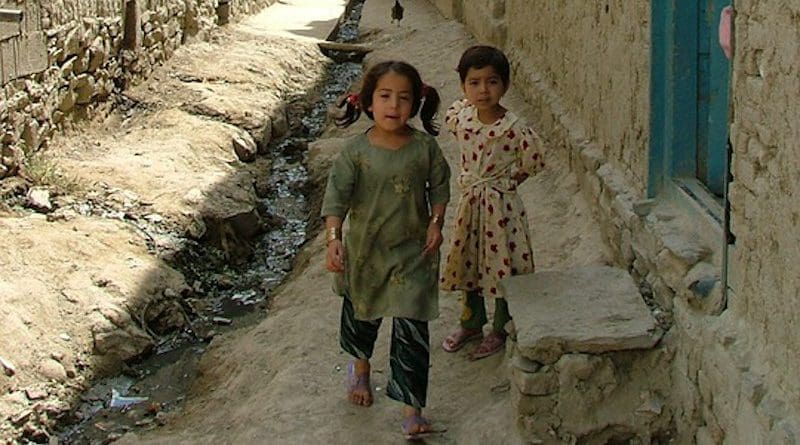Afghanistan Under Deepening Food And Humanitarian Crisis – OpEd
After the fall of Kabul into the hands of the Taliban; crisis-ridden Afghanistan faces severe humanitarian and food crises. People of Afghanistan, under great stress and crisis, are projecting a horrifying picture of misery. The humanitarian mess comprises Three million drought-affected people. Five hundred fifty thousand people are internally displaced due to conflicts this year and are dependent on foreign humanitarian aid. UNO reported that 18 million out of 38 million people are facing a humanitarian disaster. In this context, World Food Program (WFP) stated that “The Afghan people need our support now more than ever.
Currently, 1 in 3 people are hungry, and 2 million children are malnourished. With drought, pandemic, and conflict, the food security situation will continue to worsen; and hunger will rise.” In addition, UNO’s Secretary-General Antonio Guterres said, “Now, more than ever, Afghan children, women and men need the support and solidarity of the international community.” While discussing the whole scenario, WFP’s representative, Mr. Yahia, said, “The conflict did not materialize in just last few weeks. It has been ongoing for several years. This has resulted in large population displacement.”
In this prevailing situation, various humanitarian organizations have also stopped their services due to the Afghanistan’s uneasy state of safety and security. The political and military advance of the Taliban reduced healthcare capacity. And imminent humanitarian crisis risk is exacerbating with already very serious threats posed by COVID-19 in Afghanistan. The continued rise of COVID-19 cases in Afghanistan appears inevitable, but poor diagnostic capacity prevents accurate case measurement, while vaccine provision is minimal.
On the other hand, the USA has blocked foreign reserves of Afghanistan worth $ 9.5 billion. Similarly, IMF and other monetary institutions have also halted their services and fundings to Afghanistan. It has resulted in a cash crisis while crippling its weak economy. Border closure and increasing global isolation leave workers unpaid, and force local companies to shut and banks to limit withdrawals. Such moves have worsened food shortages and created inflation. As per the reports, World Food Program (WFP) in Afghanistan lacks adequate resources and finance to meet the needs of Afghanis in the current state of catastrophe.
The calamity erupted from food, and humanitarian crises in Afghanistan is multifarious. One of the dilemmas resulted from the crisis is the emergence of extreme poverty on Afghan soil. Afghanistan is among the poorest countries in the world. Asian Development Bank reported that “In Afghanistan, 47.3% of the population lives below the national poverty line in 2020. In Afghanistan, the employed population below $1.90 purchasing power parity a day is 34.3% in 2019. For every 1,000 babies born in Afghanistan in 2019, 60 die before their 5th birthday.”
Moreover, UNO’s Office of the Coordination of Humanitarian Affairs (OCHA) reported that 73% of households reported having debts, and 74% cited food as the main reason for borrowing. Besides, the Afghan economy has been dependent on foreign aid for the last two decades. The Twenty years of war didn’t produce adequate means of revenue for Kabul. Predicting from the current scenario, United Nations Development Program (UNDP) stated that due to the extremely poor condition of Afghan people and economy, there is the likelihood of universal poverty in Afghanistan, and 97% of Afghanis could plunge into poverty by mid of 2022.
The worsening humanitarian and security state has resulted in the influx of Internally Displaced Persons (IDPs) and Refugees to neighboring and western countries. All of them are dependent on the aid of international organizations and hosting states. Hosting states are hesitating to receive refugees due to the spread of terrorism on their soil. They are facing the threats of the entrance of terrorists in the shape of refugees into their territory. Apart from security concerns, hosting refugees is a costly job that needs a massive amount of funds and personnel assistance. According to US President Joe Biden, United States has evacuated more than 100,000 Afghanis from Afghanistan. But a lot more are remaining in Kabul and its surroundings. They are spending miserable life under the conservative rule of the Taliban. Certain reports and pieces of evidence were provided on social media outlets that the Taliban have initiated search and hunt operations against their adversaries and those who previously worked with foreign troops. in Afghanistan for refugees is getting horrific with every passing day.
All such emergency is also calling for significant calamities in Afghanistan. There is the likelihood of a rise in crimes, drug abuse, poor law and order situation, widespread hunger and building favorable grounds to recruit Afghanis by various extremist organizations for terrorism. To solve the issue, international humanitarian organizations, and developed states must resume altruistic support to Afghanistan. Moreover, FAO and other agricultural organizations should be provided with adequate funds to continue the process of plantation in October and their service to avoid further food shortages.
Mugeed Yahya, the UAE’s Country Director and Representative for the Gulf Cooperation Council Region, said, “We need money urgently, as I speak, we need around $ 200 million to get us from September to December, or our pipeline will break. As early as October, our pipeline of wheat will run out.” Taliban must show flexible behavior and assure the security and safety of their staff and working on Afghan soil. Moreover, the new regime in Kabul needs to implement an inclusive and democratic government. There should be just and kind treatment of the masses with the actual practice of public amnesty to all. Liberty and rights to women and minorities should be provided to erase the reservations of global powers. Otherwise, the existed situation in Afghanistan may worsen and be horrific, with possibilities of additional sanctions on Afghanistan due to the failure of the Taliban to provide tolerant, inclusive governance or honor their counterterrorism and human rights promises.
Author’s Biography: The writer is serving as Research Officer in Baluchistan Think Tank Network (BTTN), BUITEMS, Quetta.

